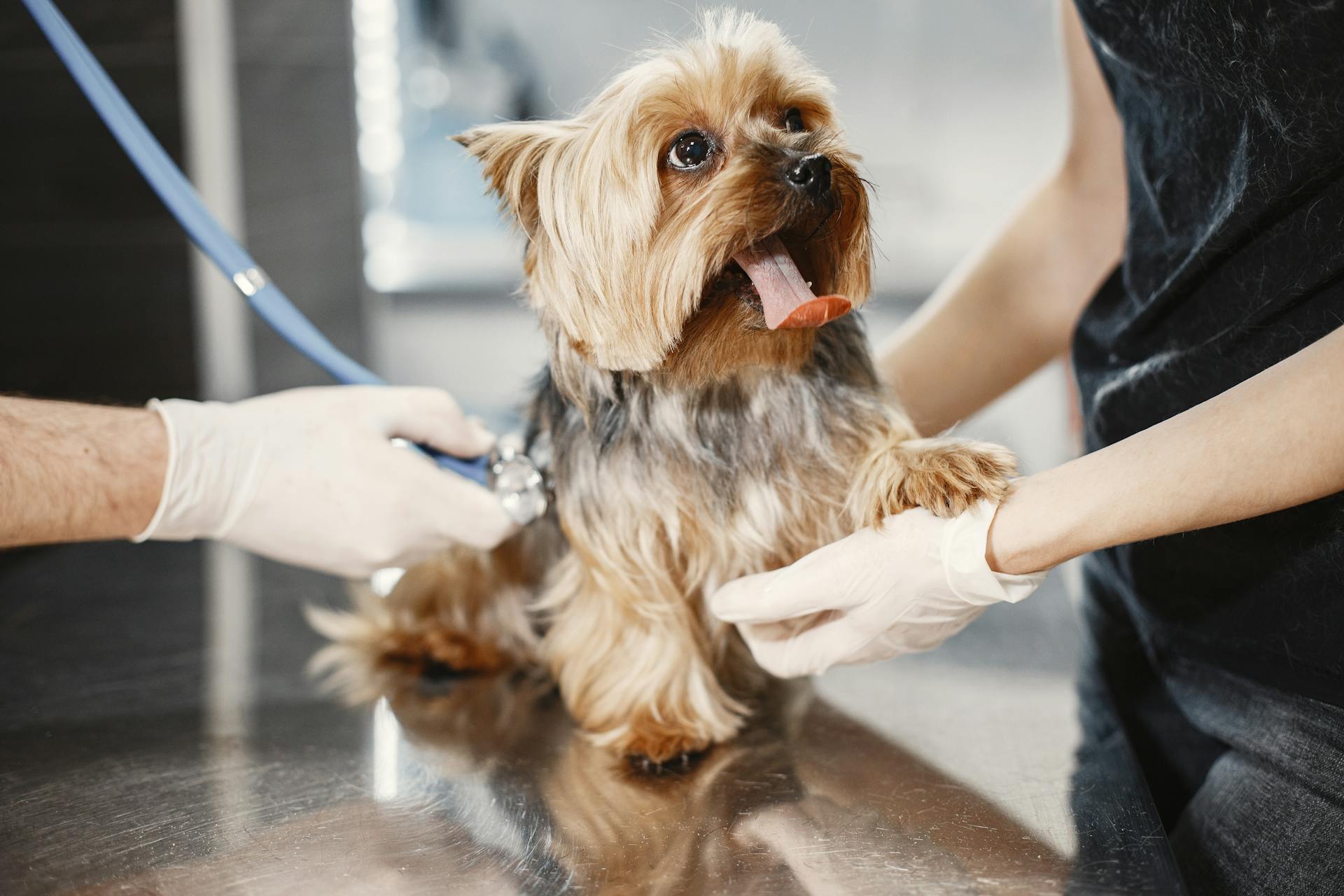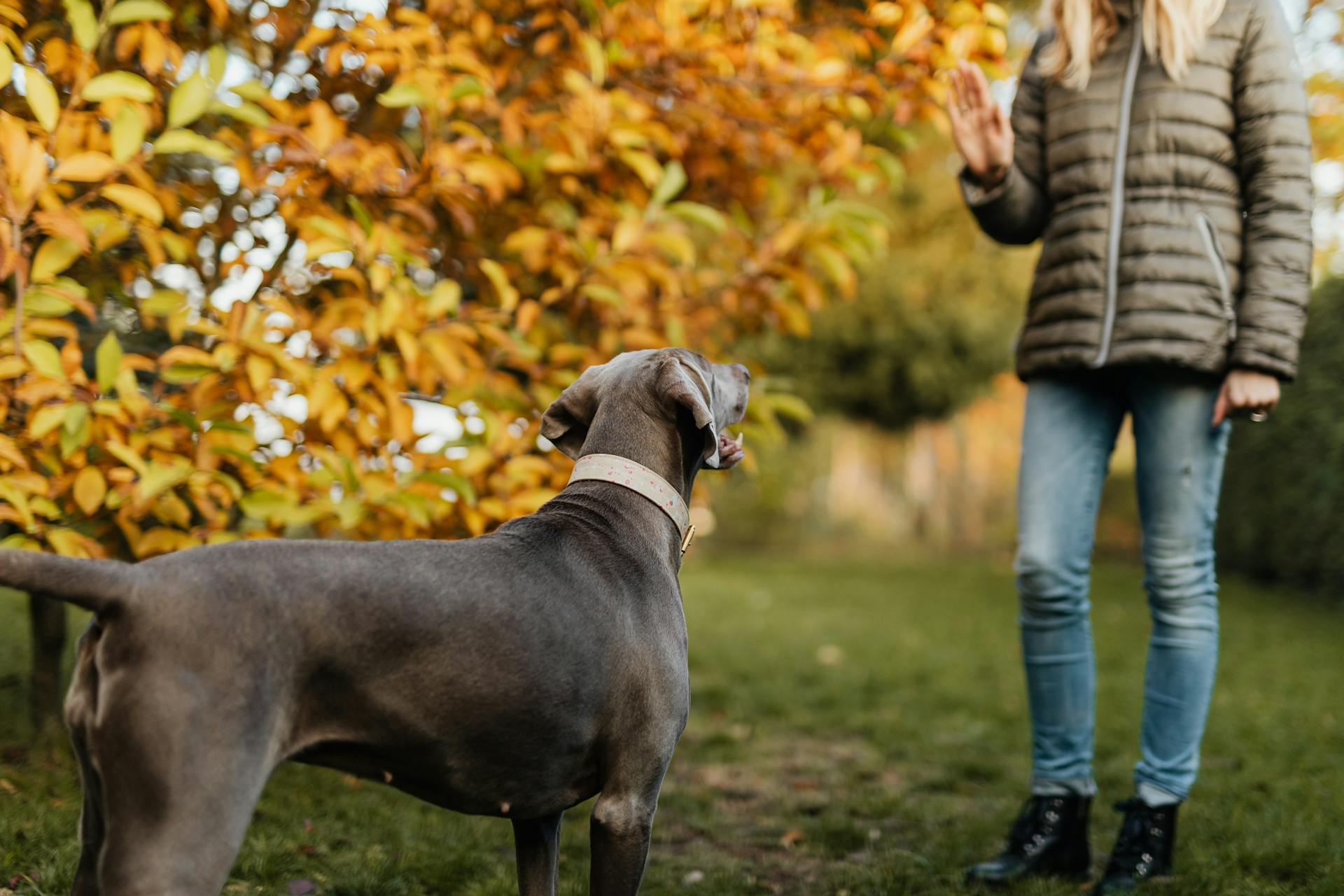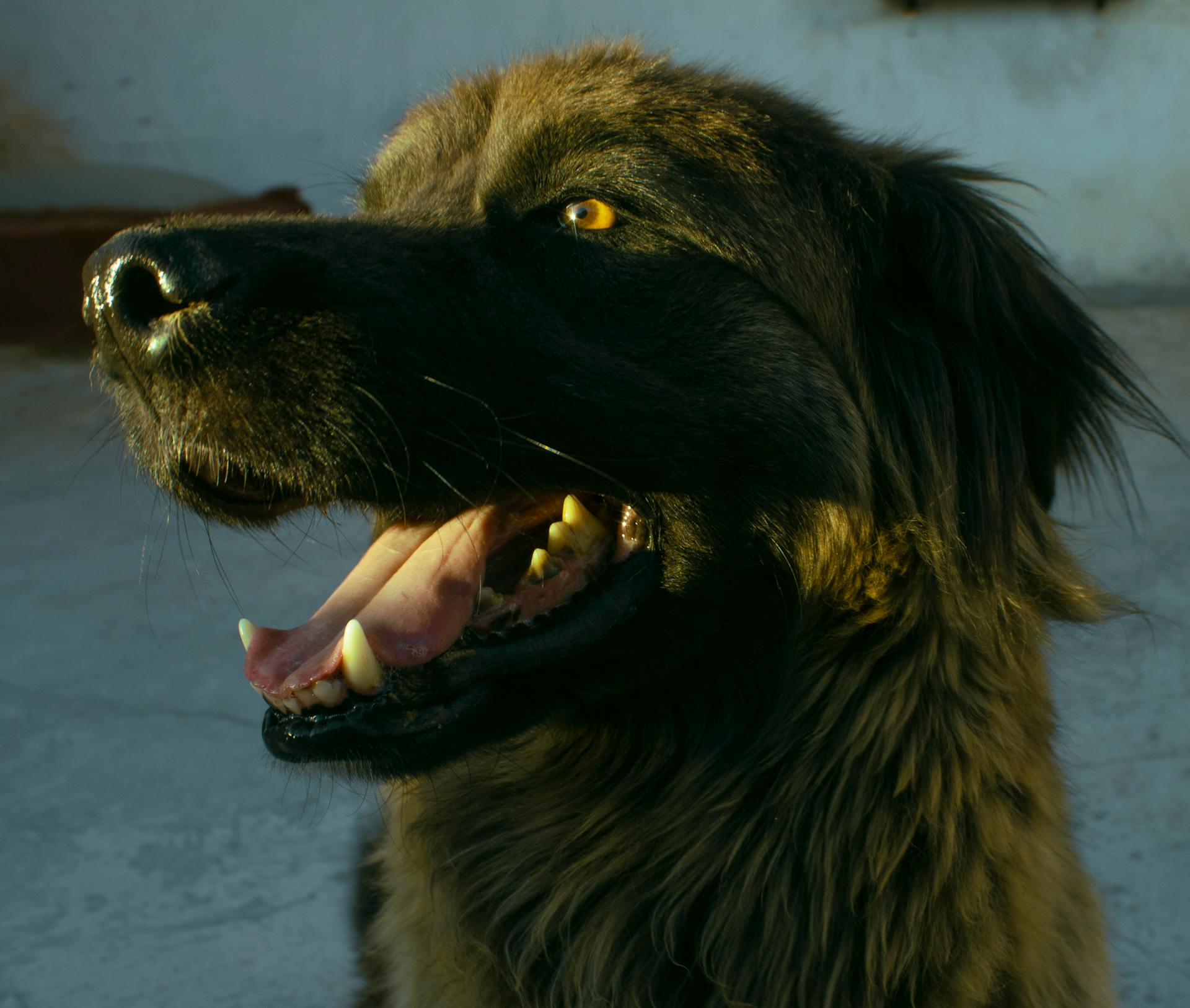
As a Boerboel owner, you want to ensure your furry friend lives a long and healthy life. Boerboels are prone to hip dysplasia, a genetic condition that affects the hip joint, leading to arthritis and mobility issues.
Regular exercise is essential to prevent hip dysplasia. Aim for at least 30 minutes of moderate exercise daily, such as brisk walking or playtime in the yard.
Hip dysplasia can be managed with proper care and attention. Keep your Boerboel at a healthy weight to reduce the strain on their joints.
Boerboels are also susceptible to skin allergies and infections, particularly around the face and paws. Regular grooming and cleaning of these areas can help prevent these issues.
Skin allergies can be triggered by environmental factors, so keep an eye out for signs of irritation and consult your vet if you notice any unusual symptoms.
Here's an interesting read: Are Chihuahuas Healthy
Boerboel Health Issues
Boerboels are generally a healthy breed, but they can be prone to certain health issues.
Elbow and hip dysplasia are two common health problems seen in boerboels, caused by a malformed joint that rubs and causes pain. Symptoms include limping, stiffness, and difficulty getting up.
Hip dysplasia is often treated with weight management, physical therapy, or surgery, depending on the severity. Elbow dysplasia usually requires surgery.
Ectropion and entropion are two common eyelid concerns in boerboels, where the eyelid turns outward or inward. Monitoring by a veterinarian and an ophthalmologist is crucial, with treatment including specialized ointments, eye drops, or corrective surgery.
Dilated cardiomyopathy (DCM) is a genetic heart condition that affects large or giant breed dogs like boerboels. It causes the heart to become enlarged, leading to a weakened heart muscle. Treatment involves medications.
Here are some common health issues that can affect boerboels:
Parasites like intestinal worms can also affect boerboels, causing stunt growth and malnutrition. Treatment involves giving the dog proper medication to get rid of the parasites.
Boerboel Nutrition and Diet
A high-quality dog food formulated for large breeds is essential for a boerboel's health. They require a lot of food, with adults eating between eight and ten cups of food daily.
Boerboels are prone to obesity, so it's crucial to count all the treats you give during training and mealtime. Choose a formula that matches their stage in life, and look for the statement that says it meets the nutritional standards set by the Association of American Feed Control Officials.
Proper nutrition is vital for a boerboel's growth, and they need food specifically formulated for large dog breeds. Dogs don't need as much carbs as we do, so focus on proteins and fat.
The best healthy dog foods have a protein source listed as the first ingredient, such as poultry, beef, or fish. You should also look for other nutrients like vitamins, omega-3 and omega-6 fatty acids, amino acids, probiotics, and prebiotics for added benefits.
Boerboels need a balanced diet that includes a mix of proteins, fats, and carbs, but with a focus on proteins and fats. If you're changing your boerboel's diet, do it slowly to avoid diarrhea, vomiting, and stomach upset.
Feeding your boerboel twice a day can be beneficial, but if you want to encourage weight gain, you might want to give them the same schedule they had when they were puppies – eating smaller portions three to four times a day.
Boerboel Health Problems and Symptoms
Boerboel health problems are a concern for many owners. Elbow and hip dysplasia are two of the most common health issues seen in boerboels, caused by a malformed joint that rubs and causes pain.
Boerboels are also prone to eyelid issues, including ectropion and entropion, which can be treated with ointments, eye drops, or surgery. Dilated cardiomyopathy, a genetic heart condition, can also affect boerboels, causing the heart to become enlarged and weak.
Other health issues that can affect boerboels include epilepsy, intestinal parasites, and congenital disorders that can halt growth. Obesity is also a significant concern, leading to a range of problems including diabetes, heart conditions, joint problems, and cancer.
Here are some common health issues in boerboels:
- Hip Dysplasia: causes pain due to a malformed hip joint
- Elbow Dysplasia: causes pain due to a malformed elbow joint
- Eyelid Issues: ectropion and entropion can be treated with ointments, eye drops, or surgery
- Dilated Cardiomyopathy (DCM): a genetic heart condition causing an enlarged and weak heart
- Obesity: can lead to diabetes, heart conditions, joint problems, and cancer
Health Problems
Boerboels are generally a healthy breed, but they can be prone to certain health issues. Elbow and hip dysplasia are two of the most common problems, which can be caused by their large frame.
Boerboels can also be affected by eyelid issues, such as ectropion and entropion, which can be inherited. These conditions can cause discomfort and vision problems if left untreated.
Hip dysplasia is a condition where the hip joint is malformed, causing pain and discomfort. Symptoms include limping, decreased activity, and difficulty getting up.
Elbow dysplasia is similar to hip dysplasia, but affects the elbow joint instead. Surgery is often the recommended treatment for both conditions.
For more insights, see: Hip Problems in Border Collies
Epilepsy can also be a problem in Boerboels, particularly in young dogs. This can be caused by hormonal changes or high stress.
Here are some common health issues that can affect Boerboels:
- Hip Dysplasia: causes hip joint malformation and pain
- Elbow Dysplasia: causes elbow joint malformation and pain
- Eyelid Issues: ectropion and entropion can cause discomfort and vision problems
- Epilepsy: can be caused by hormonal changes or high stress
- Dilated Cardiomyopathy (DCM): a genetic heart condition that causes the heart to become enlarged
In addition to these health issues, Boerboels can also be affected by intestinal parasites, which can cause stunt growth. Treatment for parasites can help normalize growth, but some dogs may never reach their full size.
Testing Tips
Genetic testing for hyperuricosuria in South African Boerboels is a reliable way to determine if a dog is a carrier of the SLC2A9 gene mutation.
To develop the disease, a dog needs to inherit two copies of the mutated gene, one from each parent.
Hyperuricosuria is inherited in an Autosomal Recessive manner, meaning carrier dogs won't have features of the disease but can pass it on to their offspring.
Breeding carrier dogs together increases the risk of having affected pups, with each pup having a 25% chance of inheriting the disease and a 50% chance of being a carrier.
To avoid producing affected pups, breeding known carriers to each other is not recommended.
Genetic testing should be performed before breeding to determine if a dog is a carrier or not.
South African Boerboels that are not carriers of the mutation have no increased risk of having affected pups.
A normal result from genetic testing does not rule out other potential causes of the condition or mutations in other genes.
Recommended read: Heat and Dogs Not Eating
What If?
What If Your Boerboel Is Too Big?
Half of the dog population is obese, including your Boerboel, which can lead to serious health problems.
Obesity can cause a range of issues, including diabetes, heart conditions, joint problems, skin conditions, kidney disease, lack of mobility, cancer, decreased quality of life, and shortened lifespan.
If your dog is overweight, you may not be able to feel their spine and ribs, their waistline may have become too big, they may refuse to go on walks, and they may be panting excessively.
Expand your knowledge: Do Purebred Dogs Have More Health Problems
You can also notice if your pup needs help getting up or down the stairs, in and out of a car seat, and so on.
To address obesity, you should take your dog to the vet to determine the right method of helping them lose weight, which may include changing the feeding routine, exercising more, and taking certain medications.
Boerboel Growth and Development
Boerboel growth is a unique process, and it's essential to understand that each dog grows at their own rate. Typically, the fastest growth occurs during puppyhood, with several growth spurts before the first year.
Boerboel puppies can weigh anywhere from 5 to 20 pounds at one month old, and their height can range from 8 to 10 inches. By six months, they can weigh between 80 and 100 pounds and stand 18 to 20 inches tall.
As you can see from the growth chart, Boerboel puppies experience rapid growth during their first year. However, it's normal for individual dogs to grow at different rates, and slight discrepancies in size and weight are usually not a cause for concern.
Here's a breakdown of the average weight and height of Boerboel puppies at different ages:
By the time they reach 12 months, Boerboels can weigh between 125 and 175 pounds and stand 23 to 26 inches tall. It's essential to remember that these are just averages, and individual dogs may vary.
Growth Chart
As your Boerboel puppy grows, it's essential to track their progress to ensure they're developing normally. A growth chart can help you monitor their weight and height, which can vary depending on their age.
Here's a general idea of what to expect at different stages of your Boerboel's growth. Refer to the chart below for a more detailed breakdown.
Keep in mind that every dog grows at their own pace, and some may be a bit smaller or larger than expected. This is completely normal, and it's essential to remember that individual dogs can grow at different rates.
How Long Do Boerboels Live?
Boerboels live between nine and 11 years on average. Genetics, life quality, diet, stress levels, and various other factors can affect their overall life expectancy.
Their lifespan is comparable to other mastiffs and large dog breeds. This means that with proper care, Boerboels can live long and healthy lives.
Boerboel Care and Maintenance
Boerboels are relatively low-maintenance dogs. They require socialization and training at a young age to become easier to handle.
To keep your Boerboel's coat looking its best, grooming is essential. Regular brushing can help prevent matting and tangling.
Dog Care
Boerboels are relatively low-maintenance dogs, but they do require socialization and training at a young age.
Their care needs are easier to handle if you provide these essentials early on.
Boerboels need high-quality dog food formulated for large breeds, which is crucial for their health and well-being.
Their large size means they require a lot of food, with adults needing between eight and ten cups of food daily.
Feeding a Boerboel can be quite expensive, especially considering their potential weight of up to 200 pounds.
A homemade diet can be an option, but it's essential to get your vet's approval first to ensure they get all the necessary nutrients.
Grooming
Grooming is a breeze for Boerboel owners, as these dogs have minimal grooming needs. Your Boerboel's coat will be healthy and shiny if you brush them once every week or two with a curry comb or soft grooming glove.
Boerboels shed, so regular brushing helps manage their shedding. Brushing also gives you a chance to check their ears for debris and wax build-up. If you notice anything, it's best to speak to your vet.
Bathing is only necessary every four to six weeks, unless your Boerboel has been super active or drooly. You may want to keep a towel handy to spot clean them or your furniture.
Nail trimming is a great task to do at bath time, as the water makes their nails softer and easier to clip. You'll know it's time for a trim when you can hear your pup clacking on your kitchen floors.
Daily dental care is crucial for Boerboels, so get your puppy used to brushing their teeth daily. And don't forget to schedule an annual cleaning with your vet – there's some tartar buildup you just can't get rid of with a regular toothbrush.
Here are some grooming tips to keep in mind:
- Brush your Boerboel once every week or two with a curry comb or soft grooming glove.
- Check their ears for debris and wax build-up during brushing.
- Bath your Boerboel every four to six weeks.
- Trim their nails at bath time.
- Brush their teeth daily and schedule an annual cleaning with your vet.
Spaying / Neutering
Spaying or neutering your Boerboel is a crucial decision that requires careful consideration. Most experts recommend spaying or neutering your dog between 6 and 8 months of age.
Spaying or neutering your Boerboel before they reach physical maturity can affect their adult size, causing them to grow taller. This is because they won't receive the same amount of hormones during puberty as they would if they were spayed or neutered later.
Consult with your veterinarian before making a decision, as they can provide personalized advice based on your dog's specific needs. It's essential to consider the potential impact on your dog's growth and overall health.
Some owners may want their Boerboel to grow larger, but intentionally spaying or neutering them early on is not recommended, except in cases where there's an underlying health issue.
More Exercise
Regular exercise is crucial for your Boerboel's overall weight and health. As mentioned before, the weight of a dog is greatly impacted by the amount of exercise he gets.
Exercise can promote the development of muscles, which will impact the overall weight. Physical activity also increases a dog's appetite, so this can help picky eaters.
Too much exercise is just as bad as no exercise, as it can cause dogs to lose too many calories and become underweight.
Boerboel Health Tips and Advice
Boerboels are generally a healthy breed, but they can be prone to certain health issues. Elbow and hip dysplasia are two common problems, which can be caused by their large frame. These conditions can cause pain and discomfort for your dog.
Boerboels can also suffer from eyelid issues, such as ectropion and entropion, which can be inherited. It's essential to monitor your dog's eyelids and consult a veterinarian or ophthalmologist if you notice any problems.
Hip dysplasia can cause limping or "bunny hopping", while elbow dysplasia can cause limping or stiffness. Surgery is often recommended for both conditions.
Dilated Cardiomyopathy (DCM) is a genetic heart condition that can affect large or giant breed dogs, including Boerboels. This condition can cause the heart to become enlarged, leading to a weakened heart muscle.
Here are some common health issues that can affect Boerboels:
- Hip dysplasia
- Elbow dysplasia
- Eyelid issues (ectropion and entropion)
- Dilated Cardiomyopathy (DCM)
- Intestinal parasites, which can cause stunt growth if left untreated
If you suspect that your Boerboel has any of these health issues, it's essential to consult a veterinarian as soon as possible. Regular check-ups and screenings can help identify potential problems early on, allowing for prompt treatment and a healthier, happier dog.
Frequently Asked Questions
What is the maximum age of a Boerboel?
A Boerboel's maximum age is typically 12 years, with some living longer due to their relatively long lifespan for a large breed. However, their genetic makeup can affect their overall health and longevity.
Featured Images: pexels.com


